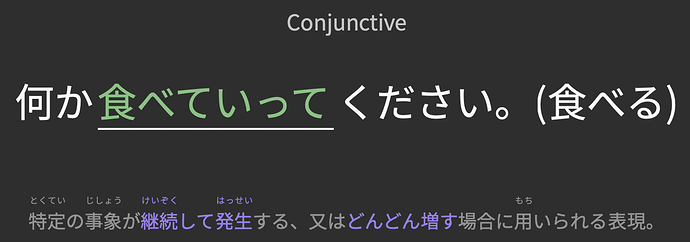I found this grammar point quite confusing at a first glance, but I felt like the example in Game Gengo’s N4 Video Textbook (it’s a long video, the relevant part starts at 2:59:30) explained it nicely.
Even after watching the Game Gengo example, I still don’t get this grammar point. What stands out to me is this bit from Bunpro: “This nuance is usually that ‘(A) happened and then went’, or ‘will happen, and then go’.”
That phrasing sounds a bit odd, and as someone who doesn’t know what it’s supposed to get across… yeah.
The phrasing is odd and you’re better off ignoring it, especially since the verb いく is supposed to be happening concurrently with the verb it attaches to (for example, 持っていく= lit: to hold and go, aka, to take).
This grammar point has two main meanings/usage.
-
Progression or Change Over Time (Gradual transformation)
 "Something continues to change or develop moving forward."
"Something continues to change or develop moving forward."
 Often used for natural changes, trends, or future developments.
Often used for natural changes, trends, or future developments.
 Frequently translated as “going to” or "continue"
Frequently translated as “going to” or "continue"
E.g. これから気温が下がっていくでしょう。
→ The temperature is going to drop from now on.
2. Movement Away from the Speaker (Physical or Abstract)
 “An action happens in a direction away from the speaker.”
“An action happens in a direction away from the speaker.”
 This is literally about physical movement or metaphorically about emotional/psychological distance.
This is literally about physical movement or metaphorically about emotional/psychological distance.
E.g. 明日、教科書を持っていくのを忘れないでね。
→ Don’t forget to take your textbook (with you) tomorrow.
持っていく=to take something (away from the speaker’s location) to another place.
I see at least four other students were confused enough by the first example sentence Bunpro uses for this grammar point to ask about it on this forum:
今日はうちで食べていく
translated as
Do you want to go and eat at my place tonight?
The Bunpro dictionary entry for ~ていく shows To ~ and go as the primary definition
This description could imply an order in which the て verb is done and then someone/something “goes” away from the speaker, but the use of and could also just mean both activities are, or will be, carried out.
I am aware that this grammar structure can also have the meaning of an action developing over time (To go on, To start), but that meaning does not seem to apply to the above example sentence.
The translation for the first example reverses the order I expected of the て form verb and the “go” action. The translation is “Do you want to **go** and eat at my place tonight? (go and eat)” when I was expecting “Do you want to eat at my place tonight and go? (eat and go)”. The two are very different sentences due to the sequence of events
Another example sentence attached to this entry shows a very similar sentence, using 食べて, translated the way I was expecting:
何か食べていってください。-
Please eat something before you go. (eat and go)
In the above example, the “before” aspect of the translation seems to have been derived from the ~ていく grammar point (a question @Bugg asked about above), thus the sequence of events being an implied feature of this grammar point
Other example sentences attached to this grammar point also translate with To ~ and go implying a sequence of actions:
-
友達にプレゼントを買っていく。 -
I am going to buy a present and take it to my friend. (buy and go)
-
車に乗る前に、朝ごはんを必ず食べていく -
Before getting in the car, I make sure to eat breakfast and then go.
-
お医者さんに行って、薬をもらっていくね。 -
I am going to go to the doctor and get some medicine. (receive and go)
-
-
- NOTE: The “going to go to the doctor” portion of this sentence is the first
に行って, and the second portion of the sentence describes the speaker receiving the medicine, then going (away from the doctor)
- NOTE: The “going to go to the doctor” portion of this sentence is the first
-
Does ~ていく imply the two verbs are done in sequence, and if so, how is the first example correct?
@slowflo clarified the first example a bit by pointing out 夕飯、食べていく? translates to Are you going to eat supper and then go?
This clarification does indeed make sense, (similar to the 薬をもらっていく example) but this is still at odds with how Bunpro has translated the first example sentence, since the translation specifically states **go and** eat at my place tonight
Can anyone clarify why the first example sentence translates the way it does?
Perhaps a more accurate translation of the first example would be “Do you want to eat at my place today (and go home afterwards)?”
i think the translation is off there.
here, in 食べていく I think the て form is simply used as “and” or to connect the two verbs, it’s not really the “special” ていく grammar point. the nuance is that “we will go eat at my place and then go”, go as in the person they’re inviting goes home, or there’s an end to the interaction. sort of as, “if you have to go home anyway, let’s first eat and my place and then you go” kind of thing. I think it’s a nice way to invite people because you show you respect their schedule and the fact that they have to leave eventually, but you want to spend more time together. that’s kind of what i got. i think this bunpro lesson kind of mixed it up. some more sentences seem to be like this.
Japanese ammo with misa is the best channel i’ve found for this. search this grammar point on her channel, she explains it really really well

